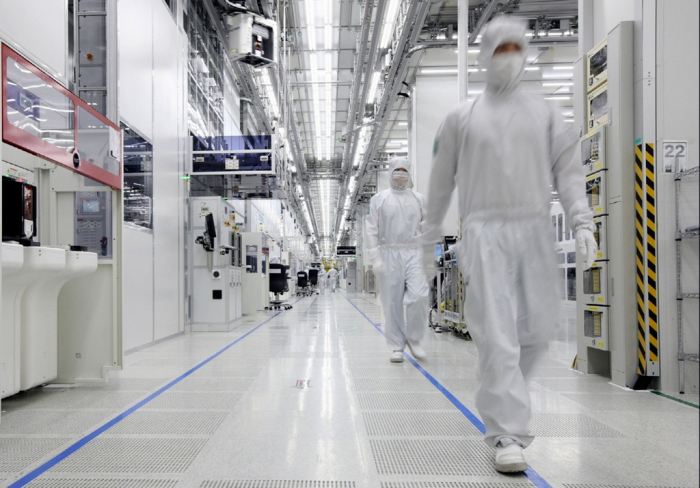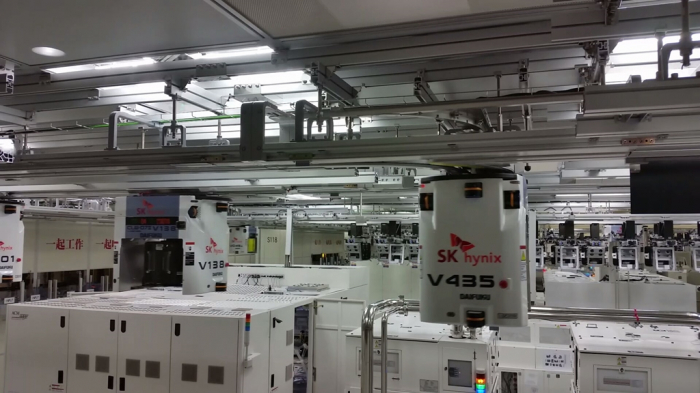Korean chipmakers
US to allow Samsung, SK Hynix to import to China for 1 year
Washington may have considered the impact of chip export bans on US IT industries, including the semiconductor equipment sector
By Oct 12, 2022 (Gmt+09:00)
3
Min read
Most Read
LG Chem to sell water filter business to Glenwood PE for $692 million


Kyobo Life poised to buy Japan’s SBI Group-owned savings bank


KT&G eyes overseas M&A after rejecting activist fund's offer


StockX in merger talks with Naver’s online reseller Kream


Mirae Asset to be named Korea Post’s core real estate fund operator



The Biden administration has decided to allow Samsung Electronics Co. and SK Hynix Inc., the world’s two largest memory chipmakers, to import equipment to their Chinese production centers for one year as the recent bans on semiconductor imports to the mainland are likely to hurt the industry in the US.
The US Department of Commerce on Tuesday officially notified Samsung and SK Hynix that the authority would not now apply the recent fresh curbs on exports to China to the South Korean tech giants related to their chip equipment and high-end semiconductor businesses, according to industry sources in Seoul.
“We reached an agreement with US authorities on measures to procure equipment for one year without a license,” said an SK Hynix official on Wednesday.
Washington on Oct. 7 released new regulations to require companies looking to supply chipmakers in China with advanced manufacturing equipment to first obtain a license from the Department of Commerce. The government aims at thwarting Beijing’s technological ambitions and blocking its military advances through the new regulation.
That caused US chip toolmaker KLA Corp. to cease offering some supplies and services to China-based customers including SK Hynix, Reuters reported on Tuesday.
The temporary relaxation slightly relieved concerns over the Chinese business of South Korean chipmakers, which remained worried that the US may want them to eventually exit from the neighboring country, their largest overseas market.
IMPACT ON US SEMICONDUCTOR INDUSTRY
The regulations are also likely to hurt the US semiconductor industry. Samsung and SK Hynix are among the top customers of Applied Materials Inc., Lam Research Corp. and KLA.
SK Hynix’s acquisition cost of mechanical equipment stood at 97 trillion won ($68 billion) as of end-June. The cost for Samsung, including expenses of facilities for semiconductors, smartphones and displays, totaled 287 trillion won with chip equipment estimated to make up most of them.
Samsung’s NAND flash plant in Xian, China, accounted for high-30% of the company’s total NAND flash output, while SK Hynix’s DRAM factory in Wuxi made up 40-50%.
They are actively upgrading facilities there to manufacture high-end products, requiring new equipment. So, the restrictions could be catastrophic for US chip equipment makers.

US CUSTOMERS OF SAMSUNG, SK HYNIX
The US government was known to have considered the bans’ impact on US tech companies such as Apple Inc. from possible production disruptions at Samsung and SK Hynix’s Chinese plants.
The two chipmakers dominated the global DRAM and NAND flash sectors with market shares of 70.9% and 52.9%, respectively. It is hard for smaller makers such as US Micron Technology Inc. to make up for any shortages if Samsung and SK Hynix face problems with production.
Any memory chip supply disruption due to the US restrictions could increase prices of semiconductors, information technology product costs and their retail prices, which will add to inflationary pressure worldwide.
Washington also needs cooperation from South Korea and the country’s semiconductor industry to maximize the effect of the export bans, analysts said.
NO FUNDAMENTAL SOLUTION
Despite the reprieve, the South Korean chipmakers are caught in the crossfire. The US has several original semiconductor manufacturing technologies, while China is South Korea’s largest overseas market for the sector.
Washington has been stepping up pressure on Seoul to join the Chip 4 alliance, which would comprise the US, Taiwan, South Korea and Japan, while China is openly protesting the US-led move.
Samsung and SK Hynix will still need to seek a license from the US authorities to import semiconductor equipment for their Chinese factories if the one-year grace period is not extended.
The chipmakers will have to report production strategies including equipment installation and repair plans to the government, which could result in the leakage of such confidential information to US competitors, industry sources in Seoul said.
Their Chinese factories may lose technology competitiveness if the US completely bans the export of state-of-the-art equipment to the mainland, they added.
Write to Ji-Eun Jeong and Jeong-Soo Hwang at jeong@hankyung.com
Jongwoo Cheon edited this article.
More to Read
-
 Korean chipmakersKLA to stop chip tool supply to customers in China: Report
Korean chipmakersKLA to stop chip tool supply to customers in China: ReportOct 12, 2022 (Gmt+09:00)
1 Min read -
 Korean chipmakersUS chipmaking association chief stresses Chip 4 Alliance not about China
Korean chipmakersUS chipmaking association chief stresses Chip 4 Alliance not about ChinaSep 10, 2022 (Gmt+09:00)
4 Min read -
 The KED ViewFour chip alliance: S.Korea's courage to overcome Chinaphobia
The KED ViewFour chip alliance: S.Korea's courage to overcome ChinaphobiaAug 09, 2022 (Gmt+09:00)
4 Min read
Comment 0
LOG IN


